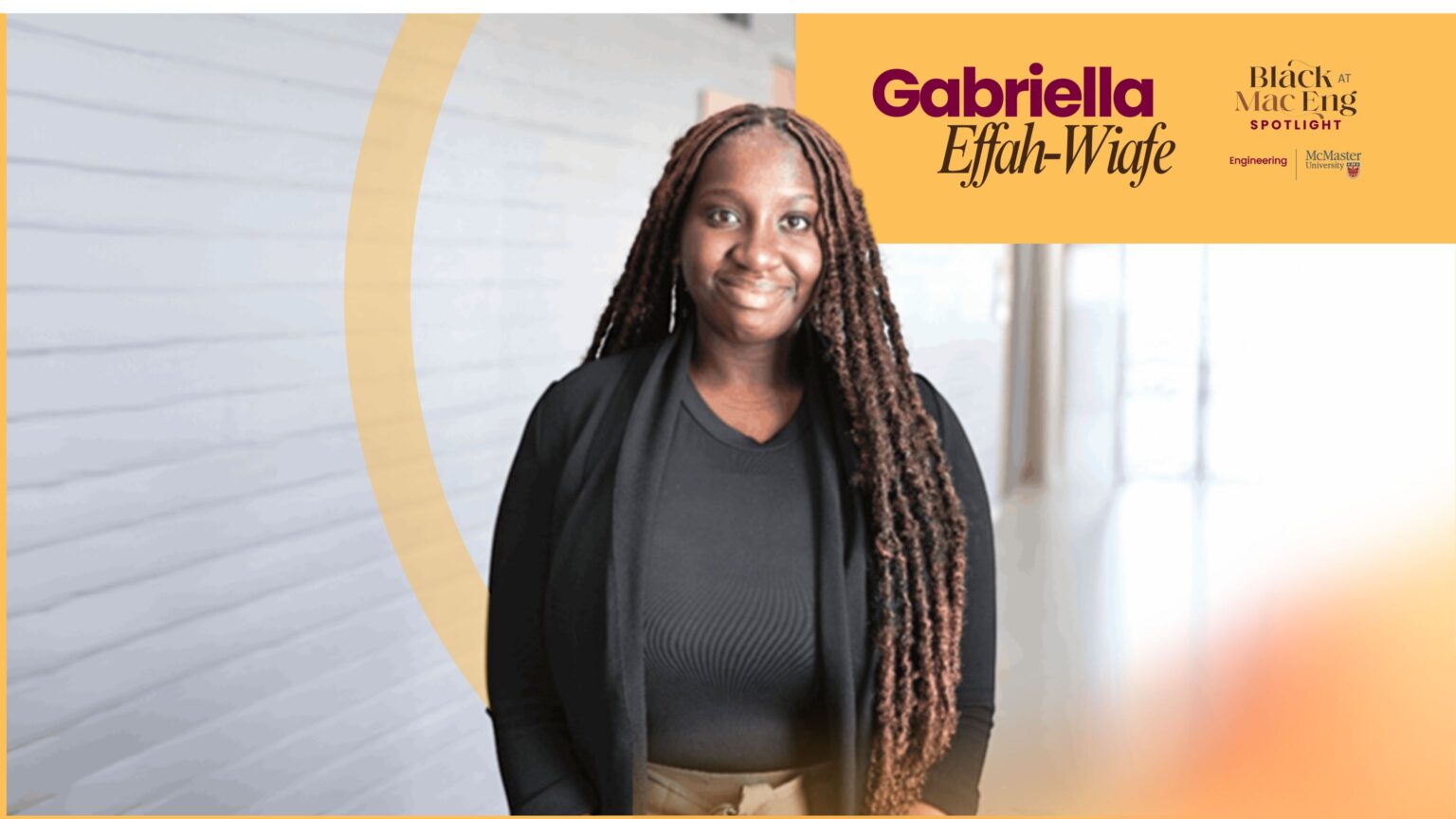
Gabriella Effah-Wiafe
Fourth-year Civil Engineering and Management student
Tell us a bit about yourself and your current role in Mac Eng:
Hello! My name is Gabriella Effah-Wiafe, and I am in my fourth year of Civil Engineering and Management. I grew up in Brampton, where I attended St. Roch Secondary School and played rugby. I have a strong interest in consulting and have completed two co-op placements. My first co-op was with the City of Brampton as an Assistant Stormwater Engineering Co-op student, where I conducted environmental inspections throughout the city. This past summer, I worked in British Columbia as a Civil Engineering Co-op student, where I was involved in design work, site inspections and some travel along the west coast!
I am also a member of the National Society of Black Engineers (NSBE) McMaster Chapter. I’ve been an executive member for about three years, with roles including Communications Chair, Hunt Coordinator and Idea Conference Co-Chair. I love how our team connects with Black engineering students on campus, providing them with the support and resources they need to excel academically, succeed professionally and positively impact the community.
What advice do you have for Black Students thinking of pursuing engineering?
The advice I would give to incoming students is to actively get involved in clubs and teams, not only those directly related to your program or faculty but also those aligned with your personal interests and passions. Joining these groups provides an excellent opportunity to meet people who share your interests, both academically and personally. It’s a great way to build friendships, expand your network and develop a sense of community on campus. Beyond social connections, being part of clubs and teams can also help you develop transferable skills, such as leadership, teamwork and time management, that will benefit you throughout your academic and professional journey.
Can you share an experience where you felt particularly supported or included within the McMaster community?
One experience where I felt particularly supported was during my involvement with NSBE. Being part of this community allowed me to connect with peers who shared similar experiences and challenges. The mentorship, networking events and sense of camaraderie within the group provided me with a strong support system.
Additionally, I felt particularly included when attending events such as Venture Academy workshops, where I had the opportunity to engage with elementary school students and help them with their activities. Contributing to these events made me feel connected to the broader community and gave me a sense of purpose beyond academics.
Another memorable experience was being invited by the Faculty of Engineering to attend events like the Michael Lee-Chin Lunch in Toronto, which brought together representatives from various organizations and universities. Being part of such events not only allowed me to network with professionals but also made me feel valued as a member of the McMaster community. These experiences have been incredibly rewarding and have strengthened my sense of belonging.
Why does representation matter in engineering and at McMaster?
Representation matters because it shows what is possible. Seeing role models in positions of influence—whether they are students, professors or professionals—can inspire confidence and belief in one’s own potential. When individuals see others who look like them, share similar backgrounds or have overcome similar challenges excelling in engineering or leadership roles, it sends a powerful message: “You can do this too.” At McMaster, representation fosters a sense of belonging and encourages more diverse participation, breaking down barriers and empowering students to strive for their goals. This ripple effect creates a more inclusive community where everyone feels capable of achieving success.
What initiatives or resources at McMaster have you found helpful in supporting your journey?
Several initiatives at McMaster have been instrumental in supporting my journey. The Black Student Success Centre has been particularly impactful, offering resources tailored to financial support, academic guidance, professional development and post-graduation planning. These services have helped me navigate the challenges of university life and prepare for my future career.
Additionally, building connections with professors, especially Black professors within the Faculty of Engineering, has been invaluable. Seeing them in leadership roles and learning from their experiences has provided me with mentorship and inspiration, reinforcing my confidence in my own abilities.
